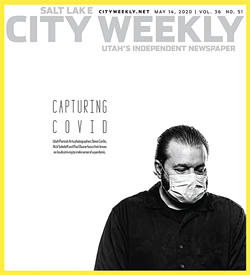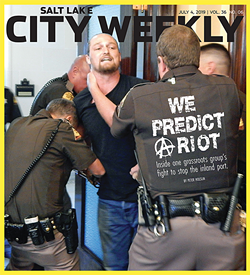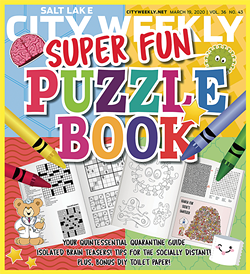"We make plans and God laughs," wrote editor Enrique Limón for the March 19 issue. "Boy, oh boy, that has never rung truer than in the past few days. Unless you've been living under a Purell-soaked rock, you'll know it's full-blown coronavirus pandemonium out there, with misinformation spreading quicker than the virus itself, and otherwise law-abiding citizens reverting to their most primal selves by punching grannies in the face over the last antibacterial soap pump on the grocery store shelf."
It was not a pretty sight. Wrenched from the modern enervation of snark and spectacle, the country had firmly landed in the COVID era with much to sort out. Not that we weren't already tracking the always-head-spinning developments of Utah news while also dealing with our own internal modifications. But them's the breaks in the world of journalism. Through our 36th year, global climate change activism was taking place, the first impeachment of President Donald Trump rocked the corridors of power and Kurdish Utahns decried the Trump administration's withdrawal of American military support from northern Syria. Erin Mendenhall was elected Salt Lake City's mayor and Gov. Gary Herbert attempted to cut into federal public forests by petitioning the rollback of the Roadless Rule.
Main Street's Eborn Books shuttered, homeless Utahns froze on the streets in alarming numbers and controversy erupted over a local child at Kaysville's Creekside Elementary coming to school dressed as Adolf Hitler. Police and activists clashed during protests of the Inland Port Authority and the old Zephyr club building was torn down—nearly 17 years after its closure. And don't forget the Utah Legislature, which balked at efforts to ratify the Equal Rights Amendment, passed an abortion "trigger law" and rammed through a major tax-reform package that raised thesales tax on services and food—subsequently spawning a public referendum effort.
City Weekly welcomed writer Peter Holslin and bid adieu to editor Enrique Limón. John Saltas stepped up once more as Executive Editor, Christopher Smart returned with a revamped "Smart Bomb" column, and a large portion of our staff was sadly furloughed in the wake of the pandemic. Even with all this tumult and trouble, our contributors produced memorable stories that provided needed clarity, such as Kaz Weida's look at Utah's clean air fight, Tara Lohan's report on Kanab's success fending off the fracking industry, Isaiah Portiz's examination of the chilling effects of Utah's Student Clubs Act, and Savannah Pace and Naomi Ward's profile of a local adoptee discovering her Chinese birth mother.
Even with all our frustrated plans and the harrowing events gripping our world, papers like ours remained in place—God willing—to keep us informed, amused, and united. Heaven knows little else was.
Remembering Vol. 36: In quarantine
"The annual Utah Chinese New Year celebration is normally a time of jubilation among Salt Lake City's Chinese American community," Jennifer Nalewicki wrote on March 5. "But this year's event, held at Skyline High School's auditorium on Jan. 25, was shrouded in an aura of uncertainty."
Organizer Xiaoming Dong told Nalewicki they almost canceled the event over ominous reports coming from overseas. "We had just heard the news from China about this brand new virus," he said, "so there was a little bit of panic about what to do."
They were not the only ones feeling this tension. Before long, the panic and turmoil wrought by the COVID-19 pandemic along with shaky official responses from near and far would be felt across this state, no less than it was for the rest of the world.
"School, services and hospitality are basically shut down statewide due to the coronavirus outbreak—and the real havoc is yet to come," John Saltas reported on March 19. Conflicting messages confused the public while local clubs and restaurants purchased supplies that would, due to shutdowns, either need to be cleared out or go to waste. Discharged employees and permanent closures awaited many small businesses across the valley, and that in turn affected papers like City Weekly. (Our revenues have always risen and fallen with the health of local hospitality, clubs, events, and cafes.)
"It hurts us to know that so many of our friends in the industry are in pain right now," Saltas continued. "We've seen the tears. It also hurts to no end to know that any next issue could be our last. That's our reality; if they die, we die." By March 22, Utah's first COVID-related death occurred in Davis County, with hundreds of cases already tracking. The times were grim and hardly helped by the rising clamor of self-styled patriots and conspiracy theorists who bristled at any measures to halt the spread of a disease no one fully understood.
"While the current health crisis has brought out the worst in some, it has also brought out the absolute best in many more," Enrique Limón observed on March 26. "It's hard to be numb when businesses and community leaders across the valley are standing up to fill the gaps left by the federal government. At every corner it's apparent that our roots are indeed tough. I would like to think City Weekly is also playing a small part in nurturing those roots."
Amidst so much uncertainty and with a shrinking staff, City Weekly put together a number of special issues for readers to weather the ongoing crisis. Immediately following Salt Lake County's public health emergency order, the paper provided a special puzzle activity book for March 19; a spotlight of local "helpers" by Alex Springer for March 26; and community reports on lockdown living and support throughout the subsequent two months. Salt Lakers could do with some diversion and uplift—they too were living on a tenuous financial thread as the health crisis deepened.
"It is only a secret to our elected officials that most Americans really do live paycheck to paycheck no matter their pay strata," John Saltas wrote in April. Similar conditions were the experience of small businesses as well, and for both groups the meager relief programs trickling out through federal/state/local governments were welcome but nevertheless insufficient. After all was said and done, Saltas wondered how much of the relief funds would actually go to the people and businesses hurting in this crisis, rather than the rich and well-connected. Nevertheless, in spite of the questions and problems, community welfare was paramount. "Public health wins," he stated.
Barely a month after putting health restrictions in place, Katharine Biele reported in May, Gov. Gary Herbert eased state enforcement, quickly followed by Salt Lake County Mayor Jenny Wilson. Biele was disgusted by the "tepid" response to the crisis and their caving to pressure from a "small but intimidating minority" of anti-mask protestors. (The less said about Utah's inflated purchase of the anti-malarial drug hydroxychloroquine as a makeshift COVID cure, the better.)
"This me-me-me generation of free-thinkers demand an opening of the economy because they don't care if they get the virus," Biele seethed in April. "Protesters apparently don't care if you get it, because they've been hearing wildly inaccurate mantra that it's just as deadly as the flu."
In the oven
"When you're a housebound food writer and all the local restaurants close their dining areas," remarked Alex Springer on April 9, "you learn to get creative." While Springer continued to observe the takeout and delivery options offered by local eateries as the pandemic unfolded, he also looked to homemade fare. "I'm an okay cook, meaning I know how to follow a recipe without screwing it up," he wrote. "But I also know my limitations." Thus, he began providing homebound readers with recipes supplied by local cooks, such as pastry chef Amber Billingsley's "Chocolate Chunk Cookies":
—8 ounces unsalted butter
—½ cup granulated sugar
—1 cup brown sugar
—2 large eggs at room temperature
—1 teaspoon pure vanilla extract
—2 ¾ cups all-purpose flour
— teaspoon baking soda
—1 teaspoon kosher salt
—8 ounces roughly chopped chocolate
Combine dry ingredients in a large bowl with a whisk and set aside. Cream butter and sugars until pale and fluffy, about five minutes. Add eggs one at a time, beating between additions to fully incorporate. Scrape bowl and mix again, adding vanilla. Add dry ingredients and chopped chocolate. Mix slowly until fully incorporated. Set dough aside in refrigerator for about 30 minutes to rest and firm up.
Preheat oven to 350 degrees. Scoop dough onto parchment-paper-lined sheet pans. Space a couple of inches apart—cookies spread while baking. I like to sprinkle a bit of flaky Maldon Sea Salt on top of mine before baking, so if you have it, give it a try. Bake 10-12 minutes. Check at 8 minutes because all ovens are different. I like mine deep brown around the edges and still a bit pale and soft in the middle. Let cool on the sheet pan, as the heat from the pan finishes baking the cookies.
More by Wes Long
-
40 Years of City Weekly—Volume 37: 2020 to 2021
City Weekly Rewind
- May 1, 2024
-
Salt Lake's modern tree canopy is a living legacy of the peoples of Utah.
Life in the Slow Lane
- Apr 17, 2024
-
40 Years of City Weekly—Volume 35: 2018 to 2019
City Weekly Rewind
- Apr 17, 2024
- More »








